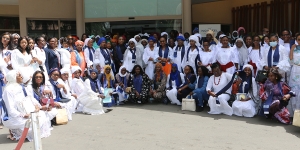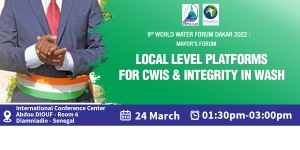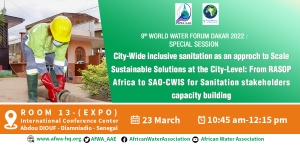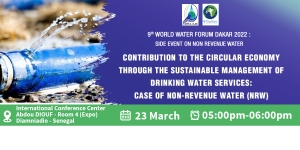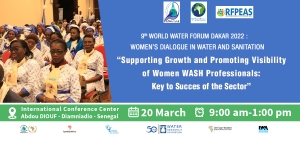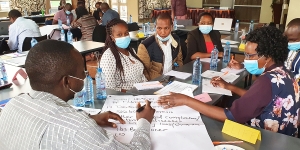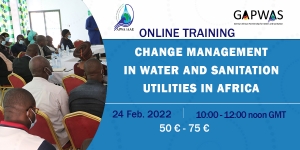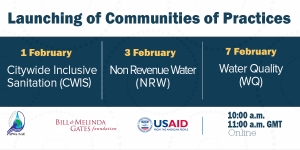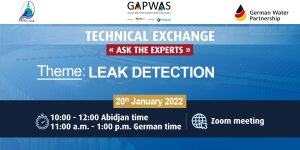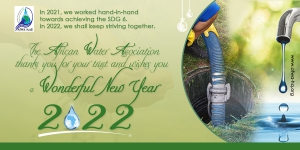Nzickonan Stéphanie
9th World Water Forum: Communique issued at the end of the Women’s Dialogue
At the Women’s Dialogue in Water and Sanitation, held in Dakar on the 20th March, 2022 under the theme “Supporting Growth and Promoting Visibility of Women WASH Professionals: Key to Success of the Sector” held under the auspices of the 9th World water Forum; the Network of Professional Women in WASH came up with the following for adoption by Governments, Policy Makers, WASH Organisations and Programme Implementors:
1. Closing the Gap: In terms of growth, we recognise that we have a long way to go in meeting SDG 6. It is needful to create space for people, especially women with multidisciplinary backgrounds, to enter the sector to help address issues of inclusion and infrastructural gaps.
2. SDG 6: We will push for Policies and Strategies relevant for attaining SDG6 to ensure sustainable water and sanitation for all.
3. Networking: We will be at the fore-front in mobilizing critical mass of women for leadership, through capacity building, sharing of experiences and learning.
4. Retention & Growth: Support women to build technical, vocational and relevant skills to ensure their retention and growth in the sector.
5. Participation: Enhance participation of women in WASH by creating an enabling environment for women’s economic development.
6. Monitoring: Develop evidence-based mechanisms to help track and consolidate the gains made so far in increasing the representation and visibility of women in the WASH sector.
AfWA and Mayors from Africa invite you in Dakar for the 9th World Water Forum
Description
Since 2016, AfWA has supported local governments and in particular municipalities in the implementation of an exchange and capacity-building platform for WASH. This has already been demonstrated by the organization of 03 forums of Mayors of Africa, notably in February 2018 in Bamako, Mali during the 19th International Congress of AfWA; in February 2019 in Cape Town in South Africa during the joint conference AfricaSan 5 and FSM5 and most recently in February 2020 in Kampala, Uganda, during its 20th International Congress.
In practical terms in WASH, AfWA has been supporting since 2014, several African municipalities to improve their performance in the sanitation service. This is done through the facilitation of partnerships in pairs between municipalities that have good performances (The municipality of Ethekwini in Durban in South Africa, the municipality of Dschang in Cameroon and today, we would add the municipalities of Tiassalé and Yamoussoukro in Côte d'Ivoire, Kampala in Uganda and Yaoundé in Cameroon). Until 2022, capacity building actions in inclusive sanitation management are planned in nearly 50 cities in 15 African countries through partnership actions funded by USAID, the Bill and Melinda Gates Foundation and cooperation German.
Given the configuration of local governments in the different countries of the world, it is important that coordination actions such as the forum of mayors so far organized only by AfWA, be extended / open to other local governors such as deputies, regional councilors, governors and counties, in short, all local governments according to the governance of the countires.
Projects included
Establish and support the operationalization of a global platform of local governments for the implementation of SDG 6 of sustainable development with a focus on inclusive sanitation.
Join the African Water Association at the 9th World Water Forum
Background
Access to safely managed sanitation services is one of the crucial challenges for most African countries. The quality and coverage of services by sanitation operators are inadequate due to many factors, including institutional fragmentation, lack of leadership, weak regulatory frameworks, poor skills in management, operation and maintenance of sanitation systems, and lack of sustainable financing models for on-going service provision. This situation is worsened by a fast population growth and sprawling and uncontrolled urbanization. In 2006, the United Nations Secretary-General’s Advisory Board on water and sanitation recognized the WOP (Water Operators' Partnerships) approach - which fosters capacity building and knowledge sharing through partnerships of water and sanitation operators - as an effective means of overcoming identified challenges and thus of improving the performance of the operators and fast-track progress in achieving the MDGs for water and sanitation services.
With the funding and technical support from the Bill & Melinda Gates Foundation during the period 2016-2018, AfWA launched a round of sanitation operators partnerships (SOP) within the “Reinforcing Capacity of African Sanitation Operators on non-sewer and fecal sludge management through peer-to-peer learning partnership” (RASOP-Africa) with the aim at improving the quality of urban fecal sludge management and non-sewer sanitation services and coverage for at least one million people in the Sub-Saharan Africa region through improving strategic sanitation planning, development of sustainable projects, and institutionalization of sustainable operational and financing framework for sanitation in utilities and/or municipalities.
Building on this SOPs experience that created a big momentum for sanitation partnerships in Africa, a new project named "Strengthening AfWA and operators’ capacity for the implementation of city-wide inclusive sanitation in Africa (SAO-CWIS)" has been initiated with the aim to expand the approach to other African cities and AfWA members in order to contribute to the SDGs and the overall urban sanitation agenda in Sub-Saharan Africa following the City-Wide Inclusive Sanitation approach.
Citywide Inclusive Sanitation (CWIS)[1] is a public service approach to planning and implementing urban sanitation systems to achieve outcomes summarized by Sustainable Development Goal 6: safe, equitable, and sustainable sanitation for everyone in an urban area, paying special attention to the needs of the poor, the marginalized, and women and girls. To advance and sustain SDG outcomes at a meaningful scale, all CWIS systems must demonstrate three core functions:
-
A responsible authority(ies) is executing a public mandate for inclusive urban service delivery.
-
The authority(ies) is accountable for performance against its mandate.
-
Resource management and planning reflect authority mandates, priorities, and performance accountability.
The World Water Forum in Dakar is an ideal platform to discuss this approach, which can contribute to accelerating the achievement of the SDGs through better delivery of sanitation services in Africa. Thus, participants from all levels and from all fields, including politics, multilateral institutions, academia, civil society and the private sector, among others, will exchange around the challenges facing the sanitation sector and about innovations to be put in place to reverse the trend of an ever-increasing deficit of suitable sanitation services.
Session Objectives
-
Discuss the local and global urban sanitation issues
-
Identify key challenges that contribute to poor sanitation in cities
-
Describe approaches: WOP, CWIS approach and Service Framework, principles and key stages for CWIS action
-
Agree on the role of the private sector and regulators on CWIS implementation
-
Explain AfWA contribution in building the capacity of African Utilities and municipalities to improve sanitation service delivery.
Join the African Water Association at the 9th World Water Forum
The African Water Association (AfWA) in its efforts to support the African Ministers' Council on Water (AMCOW) in the African Water Vision 2025, has committed to develop programs to support stakeholders. Thus, over the period 2016 to 2023, the AfriCap program aims through USAID funding to promote partnership in the field of drinking water. This program is structured around three specific objectives which are then broken down into three components:
i) Disseminate knowledge products and best practices in line with the demands of the AfWA members,
ii) Develop partnerships and mentoring relationships among AfWA members, and
iii) Strengthen the institutional capacity of AfWA.
Through Component 2 on developing partnerships and mentoring relationships among members, AfWA is implementing, among others, the WOP approach to develop the capacity of utilities in management of NRW.
The World Water Forum (WWF) in Dakar is an ideal platform to discuss this approach, which can help accelerate the achievement of the MDGs through better water quality management in Africa. Thus, participants from all levels and fields, including politicians, multilateral institutions, academia, civil society and the private sector, among others, will exchange on the challenges facing the water sector and on the best practices to be adopted for better water quality management within water utilities.
9th World Water Forum: Professional women invite you to their dialogue
In order to promote greater visibility of women’s issues at the forum, the Sunday prior to the Forum, March 20th, 2022 has been dedicated to host the Women’s Forum. This forum will bring together women professionals from women's networks and other key stakeholders in Africa and the rest of the world. The aim will be for women to share their cultural experiences and how they impact professionalism.
The session hopes to:
- Promote the exchange and sharing of experience between professional women in the sector and other actors
- Provide mentoring sessions for women in the water and sanitation (WASH) sector from different settings across the globe.
- Identify opportunities and initiatives for better involvement of women as professionals in water and sanitation sector
- Provide a platform for social-interaction amongst the women
Water treatment: AfWA is training Kenyan operators on water defluoridation
AfWA is organizing from March 1st to 3rd in Nakuru, Kenya, a training on water defluoridation for water operators, municipalities, academics and NGOs. The objective of this training is to provide useful knowledge to the actors of the sector for a better potabilization of high fluorine water, and consumed by poor people.
AfWA strengthens the capacities of water and sanitation utilities' Managers
As part of its capacity building mission The African Water Association (AfWA) is organizing, in cooperation with German Water Partnership (GWP), an online training session on Change Management in Water and Sanitation Utilities in Africa.
The overall objective of this training is to give manager and relevant staff a good understanding about « change-management » its significance, methods and option to handle with necessary changes. It’s specially to enhance their capacity in understanding changes and use methods to handle changes for the benefit of all, and to know the efficient and effective operations to manage changes.
The training will be held on Thursday, February 24, 2022 from 10:00-12:00 noon GMT, at the rate of €50 for AfWA members, and €75 for non-members.
Target groups: Management and relevant staff of water utilities, supervising authorities, Commercial Department, Municipal staff, External staff
Trainer : Jürgen Wummel, Directeur Général, Sachsen Wasser GmbH
Book your spot now!
NB : English training with simultaneous interpretation in French
For more information please send an email to This email address is being protected from spambots. You need JavaScript enabled to view it.
Join one of AfWA's Communities of practices
As part of the implementation of phase 2 of the African Water Association (AfWA) key programs, i.e., AfWA capacity building program (AfriCap) and the program for Strengthening AfWA and Operators’ Capacity for the implementation of City-wide Inclusive Sanitation in Africa (SAO-CWIS), the creation and operationalization of communities of practice on the themes below is planned: - City-wide Inclusive Sanitation (CWIS) 1st February - Water quality (WQ) 3 February, - Non-Revenue Water (NRW) 7 february.
The Communities of Practice (CoPs) of these various programs (AfriCap and SAO-CWIS) are intended to be platforms for collaboration, coordination, and synergy between the members of AfWA networks specializing in thematic areas such as Water Quality (WQ), Non-Revenue Water (NRW) and City-wide Inclusive Sanitation (CWIS).
Kindly click on the link to join the meeting !
https://us06web.zoom.us/j/89548319146?pwd=Uk81a01qbjZZQktVN1Z5Qk1seEo4dz09
ID de réunion : 895 4831 9146
Code secret : QHSL7u
Second edition of the German African Exchange of Expertise in the Field of Water and Sanitation
AfWA and its partner GAPWAS (German-African Partnership for Water and Sanitation), are pleased to invite you to the 2nd edition of "Ask the Experts", the German African Exchange of Expertise in the Field of Water and Sanitation to be held online on Thursday, January 20, 2022 under the theme: leak detection.
The technical exchange will be conducted online for 2 hours. After a short opening the two African and to German experts will give a max. 10min. presentation about their expertise on the topic (current challenges case study, research, best practice etc.). The presentations will be followed by a min. of 60 minutes of Q&A to allow a real exchange between the audience and the experts.
The audience will be composed of AfWA and GWP members, who have a technical background or have at least a high interest in the topic. They will not only get the opportunity to ask questions related to the presentations, but they can also ask for advice in cases of specific challenges they are facing.
About the concept
The German African Partnership for Water and Sanitation (GAPWAS) is the cooperation project between the African Water Association (AfWA) and German Water Partnership (GWP), financed by the German Federal Ministry for Economic Coorperation and Development, supported by sequa gGmbH. One of the goals of GAPWAS is to foster joint workshops as well as technical and peer to peer exchange and to establish contacts between GWP and AfWA members.
The present concept shall contribute to these goals by combining the expertise of German and African experts in the field of water and sanitation in the form of a jointly given workshop for the members of both associations. Eventually, the joint workshops might form the base for long-term relationships and further exchange of technical expertise and firsthand experience between Germany and the African continent. The joint identification of workshop topics underscores the mutual intention to address the real challenges and needs of AfWA members and thus contribute to a sustainable improvement of drinking water supply and sanitation in the region.
The workshops will be conducted online for 1,5 - 2 hours each and will take place on a regular basis, ideally every two to three months. Each workshop shall be conducted under a specific technical topic with at least one expert member of GWP and one expert from the membership or network of AfWA.
Season's Greetings 2022
In 2021, we worked hand-in-hand towards achieving the SDG 6. In 2022, we shall keep striving together.
The African Water Association thanks you for your trust and wishes you a Wonderful New Year 2022.

 English
English  Français
Français 
